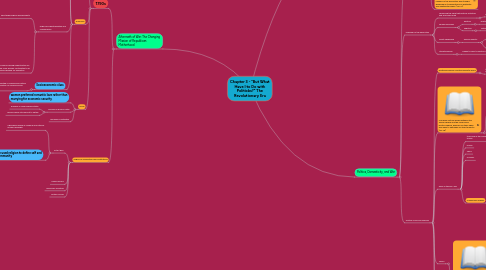
1. Aftermath of War: The Changing Mission of Republican Motherhood
1.1. 1790s
1.1.1. Political
1.1.1.1. "The influence of Enlightenment and republican thinking shifted perspectives on family authority from a patriarchal view linking father, king, and God to republican emphasis on contract, duty, and consent." (Pg. 63)
1.1.1.2. women had no "direct" political influence
1.1.1.3. after the war, more influence was put on the "republican motherhood" image
1.1.1.3.1. it was the purpose and mission of women to raise the next generation to uphold the values of a republic (federal republic)
1.1.2. Economic
1.1.2.1. West
1.1.2.1.1. white women
1.1.2.1.2. agriculturally based
1.1.2.2. South and the West
1.1.2.2.1. cash crop - cotton
1.1.2.3. origins of industrialization and consumerism
1.1.2.3.1. new technological developments
1.1.2.3.2. new income-earning opportunities for middle-class women contributed to an increased demand for education
1.1.2.4. Socioeconomic class
1.1.2.4.1. Wealth generated in commercial centers led to the creation of socioeconomic classes
1.1.3. Social
1.1.3.1. women preferred romantic love rather than marrying for economic security
1.1.3.2. increase in divorce rates
1.1.3.2.1. primarily in New England states
1.1.3.2.2. divorces were still difficult to obtain
1.1.3.3. decrease in birthrates
1.2. Origins of Associations and Institutions
1.2.1. After 1800
1.2.1.1. a gendered sense of religious and national mission emerged
1.2.1.2. women used religion to define self and find community
1.2.1.2.1. to carry out the mission of republican motherhood
1.2.1.2.2. indirect consequence
1.2.2. Prayer groups
1.2.3. Missionary societies
1.2.4. Mother's clubs
2. Politics, Domesticity, and War
2.1. Public v. Private virtues
2.1.1. "Slogans in defense of liberty and virtue, however, rang differently in the ears of women than of men. The rhetoric and imagery of the Revolution was strongly gendered in its explorations of legitimate and illegitimate power." (Pg. 47)
2.2. language of the Revolution
2.2.1. reinforced the view that political activities and aims were male
2.2.1.1. public - politics
2.2.1.1.1. private - home
2.2.2. Female pronouns
2.2.2.1. positive
2.2.2.1.1. liberty and virtue
2.2.2.2. negative
2.2.2.2.1. Britain as a "corrupt and evil mother"
2.2.3. Great Awakening
2.2.3.1. female "duality"
2.2.3.1.1. presumed female sexuality was a source of corruption
2.2.3.1.2. nonsexual female attributes connected ideas of liberty and virtue
2.2.4. Literate women
2.2.4.1. began to refer to political matters
2.2.4.1.1. public v. private "spheres"
2.3. Political Crisis and Warfare
2.3.1. politicized women and the domestic arena
2.3.1.1. the war directly effected matters of the home
2.3.1.1.1. more women than before were "interested" in politics, even if they didn't necessarily want to be
2.3.1.1.2. EX: women began signing public pledges to abstain from tea (and other British goods)
2.3.1.1.3. military conflict changed the rhythms of daily life
2.3.2. "The deep cultural divide between the female sphere and the more public political sphere, however led them again and again to apologize for their temerity." (Pg. 48)
2.3.2.1. Temerity - means excessive confidence or boldness
2.3.3. Roles in the Rev. War
2.3.3.1. took care of the cooking and laundry for troops
2.3.3.2. nurses
2.3.3.3. Spies
2.3.3.4. Couriers
2.3.3.5. Undercover soldiers
2.3.3.5.1. disguised themselves as men and fought in the army
2.3.4. Slaves
2.3.4.1. "...ironic inversion of the colonists' themes of independence, liberty, and self-government." (Pg. 52)
2.3.4.1.1. British initially offered freedom for taking their side in the war
2.3.4.1.2. Slaves that feared losing connections to their family did not take the British offer of freedom in exchange for allegiance
2.3.4.1.3. Wartime conditions enabled many slaves to acquire new liberties
2.3.5. Indian Women
2.3.5.1. no real change or improvement of life as a result of the revolution
2.3.5.1.1. loss of sons and husbands
2.3.5.2. Treaty of Paris (1783)
2.3.5.2.1. formally ended the Revolutionary War
2.3.5.2.2. gave the U.S. full control over western lands and of relations with Indian tribes
2.3.6. Major themes
2.3.6.1. women of all races and classes assumed tasks traditionally allocated to men during times of war
2.3.6.1.1. for the chapter and all of U.S. history
2.3.6.1.2. ran farms and businesses
2.3.6.1.3. took care of the family
2.3.6.1.4. public AND private spheres
2.3.6.2. If women were not citizens what was their relation to the state?
2.3.6.2.1. educated women spoke about the contradictions of revolutionary ideas in regards to women's place in society
2.3.6.2.2. Evans gives us the answer on Pg. 57
3. Introduction
3.1. American Revolutionary War
3.1.1. women's experience in the war helped change perceptions of women's political worth and capacities
3.1.1.1. many women were illiterate and education for women was not something widely accepted or accessible
3.1.1.1.1. However, that does not mean that women did not understand the ideas that prompted the Revolution
3.1.2. 1760s
3.1.2.1. Stamp Act
3.1.3. 1770s
3.1.3.1. consumer boycotts
3.1.4. 1776-1781
3.1.4.1. military conflict
